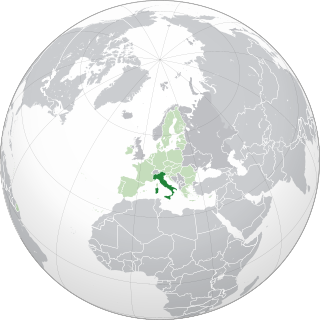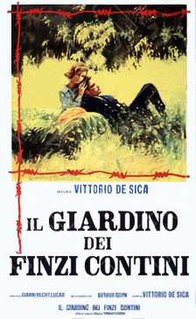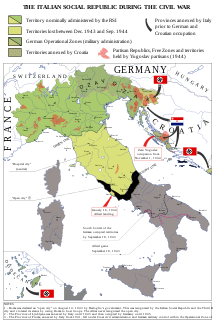Ferrara is a city and comune in Emilia-Romagna, northern Italy, capital of the Province of Ferrara. As of 2016 it had 132,009 inhabitants. It is situated 44 kilometres northeast of Bologna, on the Po di Volano, a branch channel of the main stream of the Po River, located 5 km north. The town has broad streets and numerous palaces dating from the Renaissance, when it hosted the court of the House of Este. For its beauty and cultural importance, it has been designated by UNESCO as a World Heritage Site.

Giorgio Bassani was an Italian novelist, poet, essayist, editor, and international intellectual.

The history of the Jews in Italy spans more than two thousand years to the present. The Jewish presence in Italy dates to the pre-Christian Roman period and has continued, despite periods of extreme persecution and expulsions, until the present. As of 2019, the estimated core Jewish population in Italy numbers around 45,000.
William Fense Weaver was an English language translator of modern Italian literature.
Finzi is a surname. Notable people with the name include:

Michael Korie is an American librettist and lyricist whose writing for musical theater and opera includes the musicals Grey Gardens and Far From Heaven, and the operas Harvey Milk and The Grapes of Wrath. His works have been produced on Broadway, Off-Broadway, and internationally. His lyrics have been nominated for the Tony Award and the Drama Desk Award, and won the Outer Critics Circle Award. In 2016, Korie was awarded the Marc Blitzstein Award from the American Academy of Arts and Letters.

Ricky Ian Gordon is an American composer of art song, opera and musical theatre.

Alberto Savinio[alˈbɛrto saˈvinjo], born as Andrea Francesco Alberto de Chirico was a Greek-Italian writer, painter, musician, journalist, essayist, playwright, set designer and composer. He was the younger brother of 'metaphysical' painter Giorgio de Chirico. His work often dealt with philosophical and psychological themes, and he also was heavily concerned with the philosophy of art.

The Garden of the Finzi-Continis is a 1970 historical drama film directed by Vittorio De Sica. The screenplay by Ugo Pirro and Vittorio Bonicelli adapts Italian Jewish author Giorgio Bassani's 1962 semi-autobiographical novel of the same name, about the lives of an upper-class Jewish family in Ferrara during the Fascist era. The film stars Lino Capolicchio, Dominique Sanda, Helmut Berger, Romolo Valli, and Fabio Testi in his breakthrough role.

Valerio Zurlini was an Italian film director, stage director and screenwriter.

Alain Elkann is an Italian novelist, journalist. Currently, Elkann is the conductor of cultural programs on Italian television. He is president of the Scientific Committee of the Italy–USA Foundation. A recurring theme in his books is the history of the Jews in Italy, their centrality to Italian history, and the relation between the Jewish faith and other religions. He is a writer for La Règle du Jeu, Nuovi Argomenti, "A" and Shalom magazines.
Jamie McKendrick is a British poet and translator.

Lino Capolicchio was an Italian actor, screenwriter, and director. He won a special David di Donatello acting award for his role in Vittorio de Sica's 1970 film, The Garden of the Finzi-Contini.
Giorgio De Vincenzi (1884–1965), was an Italian painter and etcher. He was a versatile artist, using diverse techniques and specialised in landscapes and portraiture.

Gli occhiali d'oro is a 1987 Italian drama film directed by Giuliano Montaldo, starring Philippe Noiret, Rupert Everett and Valeria Golino. Set in Ferrara and in a nearby seaside resort in 1938, the plot follows a Jewish student and a homosexual doctor who suffer persecution in Fascist Italy. The film is an adaptation of Giorgio Bassani's novel The Gold Rimmed Spectacles.
Valley of Shadows is a one-act ballet created by Kenneth MacMillan in 1983 for the Royal Ballet. The music is by Pyotr Ilyich Tchaikovsky and Bohuslav Martinů. The story is loosely based on the novel The Garden of the Finzi-Continis by Giorgio Bassani. The designer was Yolanda Sonnabend, who had first collaborated with him on 1963's Symphony.

The Holocaust in Italy was the persecution, deportation, and murder of Jews between 1943 and 1945 in the Italian Social Republic, the part of the Kingdom of Italy occupied by Nazi Germany after the Italian surrender on September 8, 1943, during World War II.
Isabel Madeleine Quigly FRSL was a writer, translator and film critic.

The Candiano Canal, also known as the Canal Corsini, is a canal connecting the Italian city of Ravenna to the Adriatic Sea. The canal was built as part of a construction program begun by Pope Clement XII in the early 18th century. The artificial waterway connects the Monote and Ronco rivers to the Adriatic Sea. At 11 km long, the canal is the largest artificial canal in Italy.











